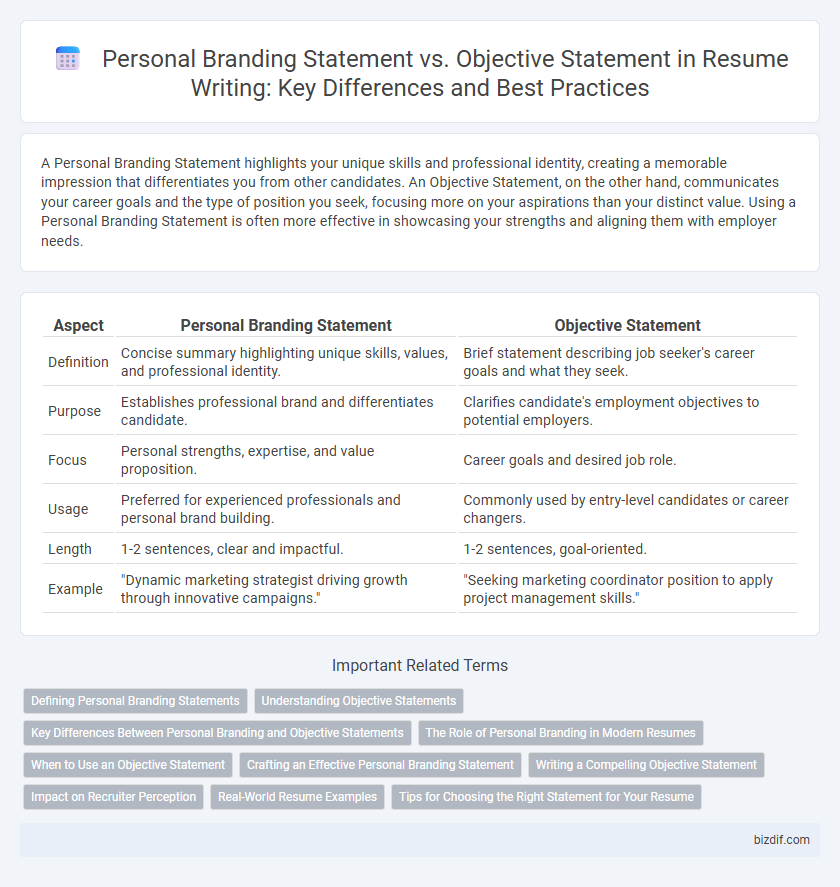A Personal Branding Statement highlights your unique skills and professional identity, creating a memorable impression that differentiates you from other candidates. An Objective Statement, on the other hand, communicates your career goals and the type of position you seek, focusing more on your aspirations than your distinct value. Using a Personal Branding Statement is often more effective in showcasing your strengths and aligning them with employer needs.
Table of Comparison
| Aspect | Personal Branding Statement | Objective Statement |
|---|---|---|
| Definition | Concise summary highlighting unique skills, values, and professional identity. | Brief statement describing job seeker's career goals and what they seek. |
| Purpose | Establishes professional brand and differentiates candidate. | Clarifies candidate's employment objectives to potential employers. |
| Focus | Personal strengths, expertise, and value proposition. | Career goals and desired job role. |
| Usage | Preferred for experienced professionals and personal brand building. | Commonly used by entry-level candidates or career changers. |
| Length | 1-2 sentences, clear and impactful. | 1-2 sentences, goal-oriented. |
| Example | "Dynamic marketing strategist driving growth through innovative campaigns." | "Seeking marketing coordinator position to apply project management skills." |
Defining Personal Branding Statements
A Personal Branding Statement is a concise, impactful description that highlights unique skills, values, and professional identity tailored to resonate with target employers or clients. It differentiates candidates by showcasing their distinct expertise and career goals, creating a memorable impression beyond traditional objective statements. This statement serves as a strategic marketing tool to align personal attributes with specific industry needs and opportunities.
Understanding Objective Statements
Objective statements in resumes focus on the candidate's career goals and what they aim to achieve in a specific role or industry. These statements are concise, targeted summaries that highlight the applicant's intentions and suitability for the position. Unlike personal branding statements that emphasize unique value and skills, objective statements center on future career aspirations and alignment with employer needs.
Key Differences Between Personal Branding and Objective Statements
Personal Branding Statements emphasize unique skills, values, and professional identity to create a memorable impression, whereas Objective Statements focus on specific career goals and the position sought. Branding Statements highlight long-term professional reputation and market positioning, while Objective Statements typically address short-term job aspirations. Effective resumes balance these elements to showcase both distinct personal value and clear career direction.
The Role of Personal Branding in Modern Resumes
Personal branding statements in modern resumes emphasize unique skills and professional identity, setting candidates apart in competitive job markets. Unlike objective statements that focus on career goals, personal branding highlights value propositions, expertise, and cultural fit. Effective personal branding enhances visibility with keywords aligned to industry standards and applicant tracking systems (ATS).
When to Use an Objective Statement
An objective statement is most effective for entry-level candidates or those changing careers who need to clearly communicate their career goals and how they align with the employer's needs. It emphasizes the applicant's intentions and eagerness to contribute, helping recruiters quickly understand the candidate's motivations. Use an objective statement when specific roles or industries require straightforward declarations of professional direction.
Crafting an Effective Personal Branding Statement
Crafting an effective personal branding statement involves highlighting unique skills, core values, and professional strengths in a concise, memorable phrase that differentiates candidates in competitive job markets. Unlike objective statements that focus on career goals, personal branding statements emphasize the candidate's value proposition and expertise, making a stronger impression on recruiters and hiring managers. Incorporating keywords relevant to the industry and role increases visibility in applicant tracking systems and ensures alignment with employer expectations.
Writing a Compelling Objective Statement
Crafting a compelling objective statement in resume writing involves clearly articulating your career goals and how you aim to contribute to the prospective employer's success. Unlike a personal branding statement that highlights your unique value proposition, the objective statement focuses on your immediate professional aspirations tailored to the specific job role. Use precise language and quantifiable achievements to make the statement resonate with recruiters and align with the job description.
Impact on Recruiter Perception
Personal branding statements emphasize unique skills and professional identity, creating a strong, memorable impression that differentiates candidates from others. Objective statements often focus on career goals, which may appear generic and less compelling to recruiters seeking immediate value and fit. A well-crafted personal branding statement enhances recruiter perception by showcasing authenticity and alignment with company needs, increasing the chances of advancing in the hiring process.
Real-World Resume Examples
Personal Branding Statements reflect a candidate's unique value and professional identity by highlighting key strengths and career goals, often seen in resumes of industry leaders and innovators. Objective Statements, commonly found in entry-level or career-change resumes, focus on specific job targets and immediate goals but lack the distinctiveness of personal branding. Real-world examples reveal that employers favor Personal Branding Statements for their ability to convey confidence and differentiators, making resumes stand out in competitive job markets.
Tips for Choosing the Right Statement for Your Resume
A Personal Branding Statement highlights your unique value and professional identity, making it ideal for experienced candidates aiming to differentiate themselves in competitive job markets. An Objective Statement, focused on specific job goals, suits entry-level applicants or those changing careers who need to clarify their intentions. Choose the statement that aligns with your experience level and career goals to effectively capture recruiters' attention and tailor your resume to the job description.
Personal Branding Statement vs Objective Statement Infographic

 bizdif.com
bizdif.com